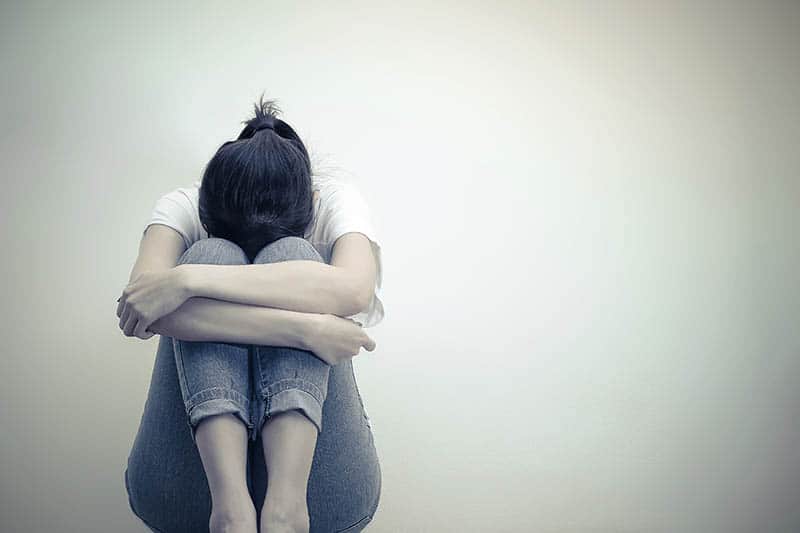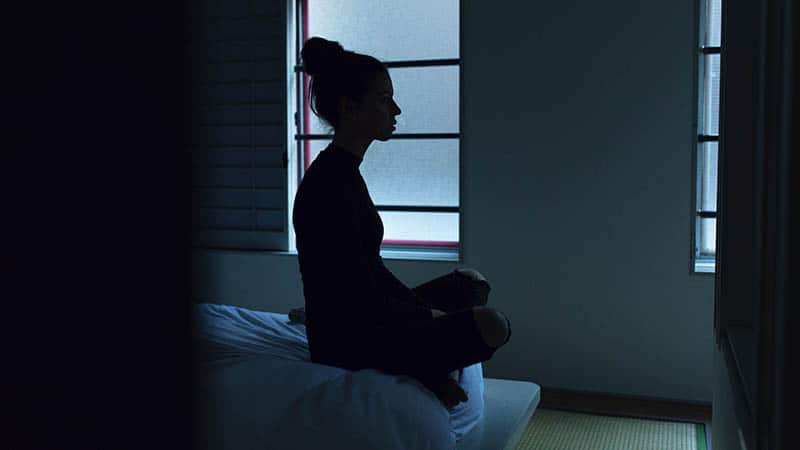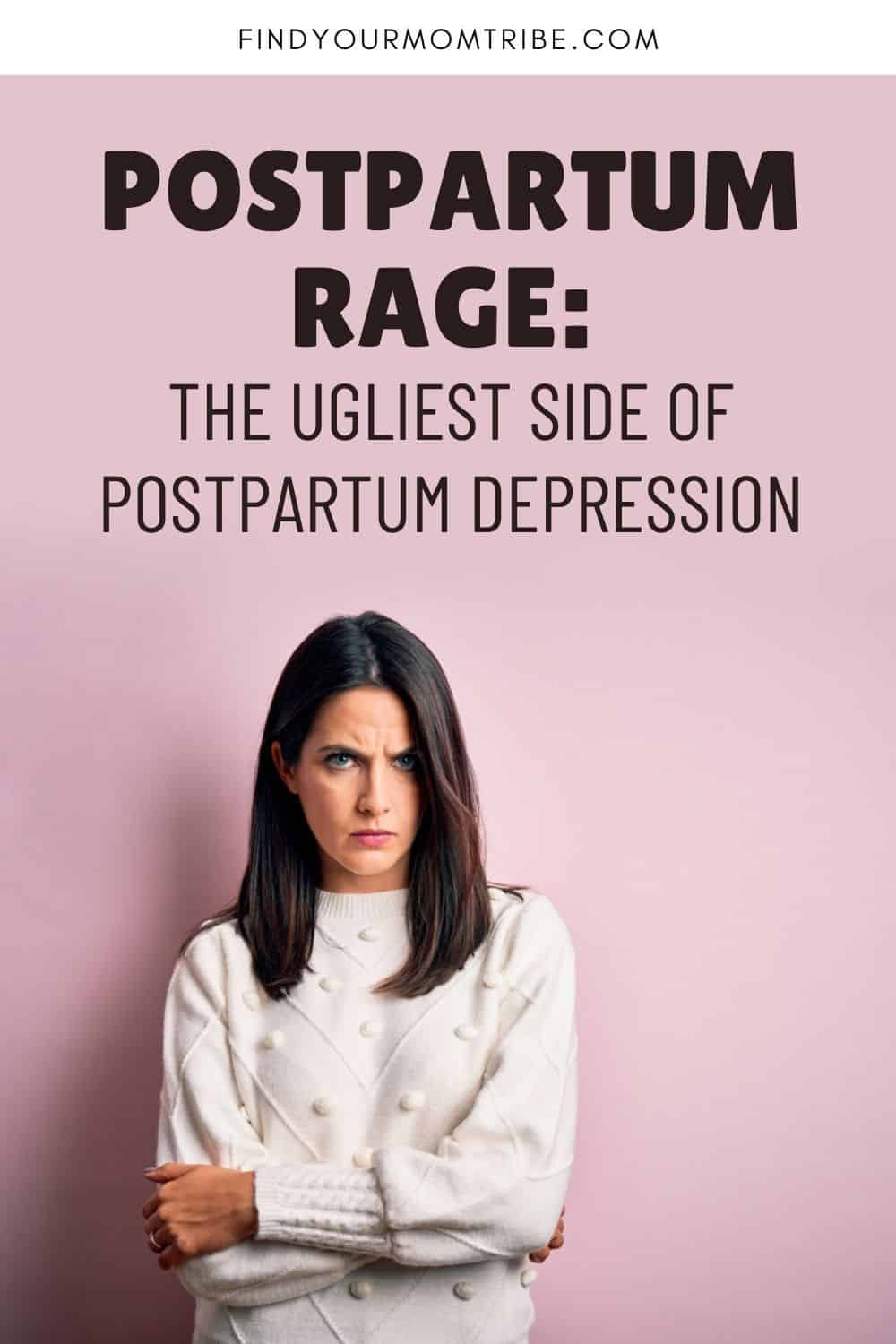The postpartum period hits us all and it comes with a whole slough of burdens, one of the main ones being postpartum rage.
Let me tell you, it’s not pretty and some of you already know that. It’s a nasty problem that most, if not all new moms tend to go through.
Sometimes they’re aware of it, but most of the time they’re not aware of the effects it has on their own mental health and the health of those around them.
Now, if you thought that postpartum depression wasn’t talked about enough, postpartum rage is even less represented, as people generally have this pre-constructed image of new moms being either happy because they are a mom now, or sad because they’re overwhelmed.
They don’t understand that there’s a whole rainbow of emotions that come into play here and that the feeling of being overwhelmed can be expressed in different ways.
But what is postpartum rage really and what can you do to help prevent it from spilling over into your life and affecting everyone around you, and most of all, yourself?
What Is Postpartum Rage?

Calling it a postpartum mood disorder wouldn’t be too far from the truth.
It’s like a follow-up condition to postpartum anxiety and depression that about 15% of all women get to experience.
It’s a point that you reach where you simply can’t take the outside pressures anymore, when you’re too busy to look at the signs of all of that stress welling up, the lack of sleep catching up on you, and your habits taking an unhealthy turn.
Unexpected outbursts

All of this stress boiling up inside of you, it’s ready to burst at a moment’s notice and all it takes is something small to tip you over the edge and have all of that nasty mental baggage spill out in a volatile manner.
It could be a simple call from a nagging mother in the morning, the crying of your little one in the car, your husband asking you to help out with a little chore, or simply something that your friend said that didn’t gel with you 100%.
Literally anything. And then this uncontrollable beast awakens to try and expel all of the accumulated volatility inside of you through anger, shouting, even an urge to inflict pain on others to help you transmit your feelings.
It is a state where your nerves are literally exploding in front of your eyes. Where you feel like you’re just the bystander while all of this is going on.
It’s not something you ever want to say or do, but it’s like someone else takes over and you’re just the bystander, watching it all play out.
All of these things mentioned are a common symptom of postpartum depression and, if left untreated, can and will transition into postpartum anger or rage.
But for some, treatment isn’t that easy to go for.
There are two reasons.
The first one, as always, is awareness.
Sure, mental health awareness has taken strides in becoming more prominent around the world in modern times, but it’s still nowhere near enough to being socially acceptable that everyone has some issues, and is still stigmatized more often than not.
Seek help

People are afraid of seeking help because they’re scared of being mocked and feeling “left out” of society as a whole because they think they’re different.
I can tell you right now that if you’re feeling like this, know that that’s definitely not the case.
Nearly everyone has problems with their mental health, they just want to hide and repress them, much like you feel like you need to, but you don’t.
It’s not your fault

Whether it’s postpartum rage or any other issue, these things just happen if we don’t know the signs. What is important is to seek professional help from a healthcare provider.
Someone who has experience recognizing the symptoms of postpartum depression and anger and can help you recognize these problems and acknowledge them as well as deal with them properly.
This brings me to the second reason: knowing you are suffering from postpartum rage.
Also interpreted as noticing the signs of postpartum anger.
Normally, when you aren’t overwhelmed, you would notice these:
- Your muscles are starting to get overly tense
- You’re feeling fatigued or feel any odd sort of pain.
- Your heart starts racing
But when you’re a mom, you choose to repress all of these in favor of pleasing your baby’s needs, while still trying to catch up with the life you had prior.
You might see the signs, but put them aside thinking they’ll just pass.
“Just one more nappy, just one more cradling and rocking. But what if the baby wakes up when I try to rest?
I can’t rest now, I have to stay up, the pain and discomfort will subside. It’s nothing, really…”
Sound familiar?
When you think about it at the time, it might be considered as nothing, but in reality, when you’re looking at it now, you can see how it has signs of increasing stress plastered all over – signs of someone pushing themselves way over the limit.
It’s a period all women experience when they become moms.
Some managed to come out on top with it, some sadly do not. But that isn’t a trait of them being weak, just a sign of it being too overwhelming. Asking for help is nothing shameful.
Acknowledging the symptoms

Your well-being is just as important as that of your child and everyone around you. You can’t ensure the latter without taking care of yourself first.
Something I’ve mentioned time and time again through my articles is personal health, especially mental health.
You can’t expect to be the best mom you can be if you aren’t the best yourself that you can be in your own head – when you’re locked up, fatigued, and suffering from an unhealthy dose of sleep deprivation just because you want to do everything yourself.
Please, try to stop this unhealthy behavior.
I know it’s hard – and it’s difficult to relay empathy over lines of online text – but please don’t torture yourself! Don’t neglect yourself in favor of pleasing others, even if that other is your baby.
You don’t have to be a parent alone. You have your partner, first and foremost.
Then there are other family members that can be called to assist.
If you’re feeling overwhelmed at any point, don’t hesitate to give them a call. Many of them will gladly help you out, no matter what kind of relationship you have with them.
Exercising self-care

Learn when to lay back and take it easy, when to rest. You’re not a machine, you’re a person and you should treat yourself like one.
If you can’t figure out how to do that on your own and you feel like you’re a slave to motherhood (a rather unhealthy outlook toward a rather blissful period of a mom’s life), then look for the aid of a certified professional.
Seeking professional help

Whether it’s a psychiatrist, psychologist or a midwife, it doesn’t matter, any of the three are probably the most qualified to be the stepping stone toward your new life – a healthier one.
You can always seek further support through social media support groups or even mommy mental health support groups in your area if there are any.
Your treatment options are vast and plentiful, though you should still stick to professionals first.
God knows they know more on the matter than me, and even I needed help dealing with my postpartum depression (PPD) turning into postpartum rage.
My experience

Yes, even I have gone through my bout of postpartum rage. Heck, I’m pretty sure it almost turned into postpartum psychosis at one point.
Everything started as it normally would for a new mom. I’d just delivered my first child, my little girl.
I looked into her baby blues and fell in love with her. My labor of love.
I thought – no, I knew it was my duty to give her everything she would need and be there for her, no matter the time of day or anything.
I thought I could do it while maintaining my old lifestyle.
Boy, how wrong I was.
Where it started going downhill

Initially it started off okay, I was managing everything, changing diapers, breastfeeding, lulling her to sleep, the works.
All of this while making food, cleaning around the house, making sure hubby got up on time for work, and researching baby products on the internet.
But it caught up fast. After a week of this hectic lifestyle, I began feeling light cramps, I began feeling lightheaded as well – dizzy.
I didn’t even realize that I was only sleeping 2-3 hours a day.
I was just repeating this idealistic dogma in my mind: “It’s fine, just a little bit of random pain, it’ll clear up. Must be something lingering from pregnancy.”
But it wasn’t. The pregnancy bit had passed when I recovered from my c-section.
This was purely me stressing my body, pushing it past its intended limits for way longer than it was meant to be pushed.
The first sign of the problem

Soon enough, all those words I’d been saying to myself started turning into panic when I realized I couldn’t catch up to everything anymore, how I didn’t have time to go back to work because I HAD to devote so much time to the baby and I couldn’t risk leaving her with a nanny at home or my parents.
What if they couldn’t change a diaper? What if there wasn’t enough breast milk stored?
This was when I hit my postpartum depression, the moment where I started sinking further toward postpartum rage.
I still thought this was normal and didn’t want to ask anyone around me for help because I thought that would make me seem like a weak or bad mom.
So I continued with my sleepless nights, some mild panic attacks in the night or bouts of crying that I attempted to hide by saying it was just something I had remembered, that it was fine.
But it really wasn’t.
It wouldn’t be long before my body began to react violently to this, both physically and mentally.
Almost as if my body gained sentience and wanted to scream out “STOP” all on its own.
Hitting rock bottom

It first happened when my husband asked me if I could do the dishes for that day.
It was then that I first had my postpartum regurgitation of the vilest language and response I had ever given in my life.
I can’t remember all of the details, nor am I willing to write such profanities on this blog. Needless to say it felt like I spat acid at him and for no good reason.
It wasn’t his fault for asking me, he simply didn’t know what I was going through since I was hiding it.
I broke down right after and cried for a good thirty minutes straight, almost fainting from exhaustion, but even then I didn’t stop to look for help.
There were a few more outbursts like this, either over phone with my parents or with a friend in person, but I just couldn’t get it.
It was carrying the danger of spilling out into something worse, even so far as developing a permanent issue or me suffering from a breakdown that I might not be able to recover from.
My saving grace

Thankfully, my husband staged an intervention where everyone who had experienced the effects of my postpartum rage pointed it out to me.
It was this show of support that finally got me to acknowledge this for the problem that it was.
Acknowledge that I was suffering, that it wasn’t any good for the baby, me or anyone else in my vicinity for me to be a nervous wreck.
It took all of the people in my life to get me to seek professional help, to show me that it was a real problem, and to show me how to deal with it, And I will be forever grateful.
The ascent back

The therapist made me realize that it wasn’t just my job to take care of my baby, that it isn’t meant to be considered a job to begin with, but a passion rather, something you love – not something you should risk your health over.
They helped teach me how to organize myself better, that all of my panicked thoughts were for naught, and that asking for nannies or family members to come over and alleviate some of the pressure from time to time is a perfectly natural thing.
They showed me how, once you become a mom, you can’t return back to your old life – not initially.
There is a new member of the family that requires care and some sacrifice.
It was at this time that I realized I couldn’t continue with my old job just yet and the point at which I decided to become a stay-at-home mom.
A similar process happened when I had my second child, but it was a lot milder and more controlled.
I didn’t hide the fact that I was having some issues juggling between taking care of a newborn and a two-year old, and it never went downhill as badly as it did the first time around.
I sought parenting help out in time and fixed my schedule up appropriately.
Conclusion
Postpartum rage can be a horrifyingly nasty process.
Reaching it in the first place means a mom has been neglecting her health and putting way too much on her plate to begin with already, and it can be near impossible to get out of this state alone.
It’s something you can’t just brush off and say it will be fine later.
It will linger and it will get worse. I beg you once again to please seek help if you notice these problems start appearing or if you start feeling overwhelmed.
Take the time to think about what’s going on with your postpartum body and don’t ignore the symptoms.
I have suffered through it and I want to prevent any other mamas from having to go through the same ordeal or worse.
I trust that all of you reading this are great moms who realize that seeking help isn’t a sign of weakness.
It takes a strong will for someone to admit that they need help.
Like this article? Please share or pin it for later. You can also stay in the loop and follow us on Facebook, Instagram and Pinterest.

This post contains affiliate links. Please see our full disclosure for more info.

